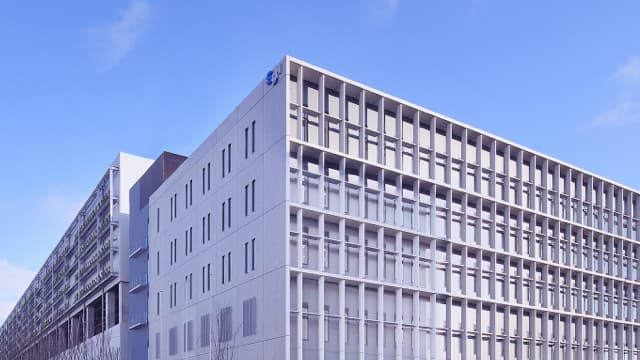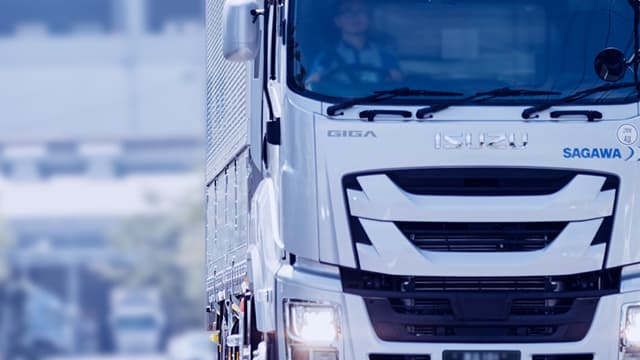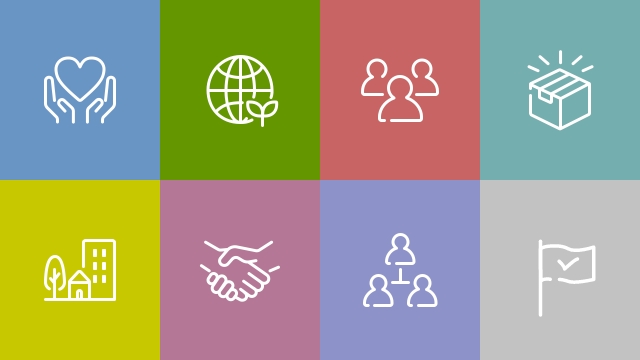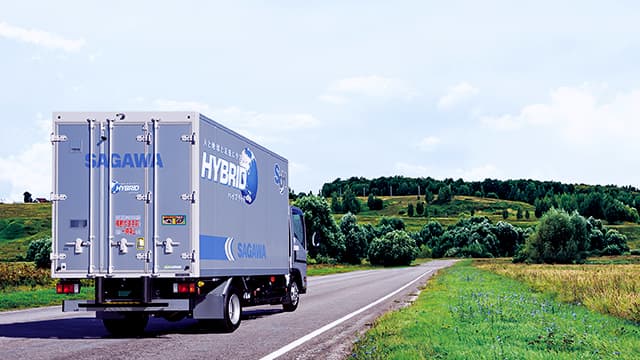Circulation of Resources
Policy
The Group believes that it is its responsibility as a company to reduce the use of various resources in business activities and cyclically use limited resources by recycling the resources used as much as possible. In accordance with the Environmental Policy mentioned earlier, we will promote the 3Rs of reusing, reducing, and recycling resources used in the Group, in addition to handling part of reverse logistics related to recycling through business in order to contribute to a sound material-cycle society.
Initiatives
Reduction of Waste through Recycling
Adoption of Eco-friendly Uniforms
The SG Holdings Group is promoting “green purchasing” to select products with low environmental impact, and as part of this, the uniforms of Sagawa Express are made from recycled PET bottles and are certified by the Eco Mark. From fiscal 2002 to fiscal 2023, approximately 3.59 million eco-friendly uniforms were made from approximately 17.8 million 500ml PET bottles. In addition, the work gloves used by our sales drivers® are also Eco Mark certified.
| Number of uniforms | Equivalent number of 500ml PET bottles | |
|---|---|---|
| Eco-friendly uniforms (Cumulative total until fiscal 2022) |
3.59 million | 17.84 million |
Process of Making Uniforms
- The labels and caps of PET bottles are removed, and the bottles are washed
- The bottles are crushed to produce PET flakes
- PET flakes are melted to produce fibers
- Sewn uniforms are completed

Eco-friendly Facility Repairs
SG Realty has introduced an environmentally friendly construction method that utilizes waste PET bottles for paving and renovation on its owned properties. In this method, a modifier produced from waste PET bottles is added to asphalt, and the high durability and water resistance of the asphalt reduces the frequency of renovation and repairs, while also reducing the environmental impact by using waste PET bottles. As of fiscal 2023, a total of 6,493 m2 of asphalt pavement has been constructed, recycling the equivalent of a total of about 100,000 waste PET bottles (500 ml PET bottle equivalent).
Recycling When Replacing Vehicles
Vehicles used by Sagawa Express and other Group companies are purchased by SG Motors and either resold or properly disposed of by specialized companies in accordance with the recycling law.
Some sites also store waste oil, such as engine oil from vehicle maintenance, in underground tanks and reuse it to fuel boilers in the winter, thereby recycling resources.
The heat (hot water and steam) produced by the boilers is used for floor heating in the plant, road heating on the premises, and other measures to prevent snow accumulation. Using the hot water for car washing throughout the year reduces the amount of water and detergent used and the labor required to wash cars in the winter.
Main Recycling Items
- Recovery and recycling of vehicle oil
- Recycling of waste related to vehicle maintenance and body manufacturing
- Recovery, replacement, and recycling of waste batteries
Reverse Solutions
The Group is contributing to the promotion of a recycling-oriented society by providing a variety of "reverse solutions" that utilize expertise in reverse logistics related to the processing and recycling of waste.
Pick-up and Repair of Home Appliances (Sagawa Express)
The Home Appliance Repair Service provides a one-stop solution from the pick-up to the actual repair and return of devices in the Home Appliance Repair Center at the Sagawa Tokyo Logistics Center.
In addition, the company has been providing nationwide Home Pick-up Services for Used Small Home Appliances based on the Home Appliance Recycling Act since 2015 as an outsourcing business from ReNet Japan Group Inc.
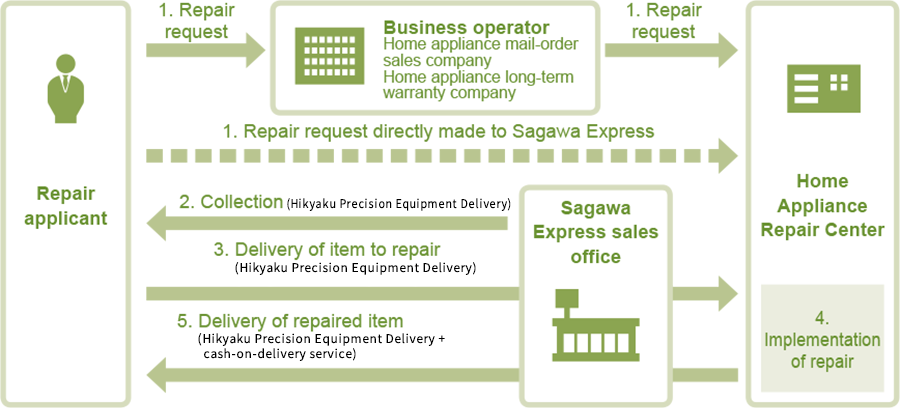
Household Appliance Collection Matching System SG-ARK (SG Moving)
SG Moving provides the “SG-ARK” service, which supports the legal and smooth collection of home appliances for recycling in accordance with the Home Appliance Recycling Act. Business operators that sell home appliances and business operators that manage rental properties are required to collect four items* they sell, and if they outsource the collection, they must arrange a licensed collection and transport operator. Recently, against the backdrop of the growth of the e-commerce market, it has not been easy for retailers and other companies with sales networks expanding nationwide to arrange collection and transport operators nationwide, and issues such as illegal dumping and inappropriate collection by unlicensed operators have arisen, resulting in one of the issues in promoting recycling. SG-ARK makes it possible to smoothly arrange licensed collection and transport operators nationwide.
In 2022, in order to improve the convenience for emitters, we established a scheme that can be used to refurbish small home appliances other than the four home appliances handled by SG-ARK by working with ReNet Japan Recycle, Inc., which has strengths in small home appliance recycling. SG Moving has formed partnerships with local governments nationwide, and is working to solve local governments' issues such as reducing illegal dumping and reducing the workload involved in recycling, by utilizing this service. We will continue to strengthen our partnerships with local governments and promote proper recycling, and contribute to the realization of a sustainable, recycling-oriented society.
*Televisions, refrigerators, freezers, washing machines/dryers, air conditioners (limited to those for general household use)
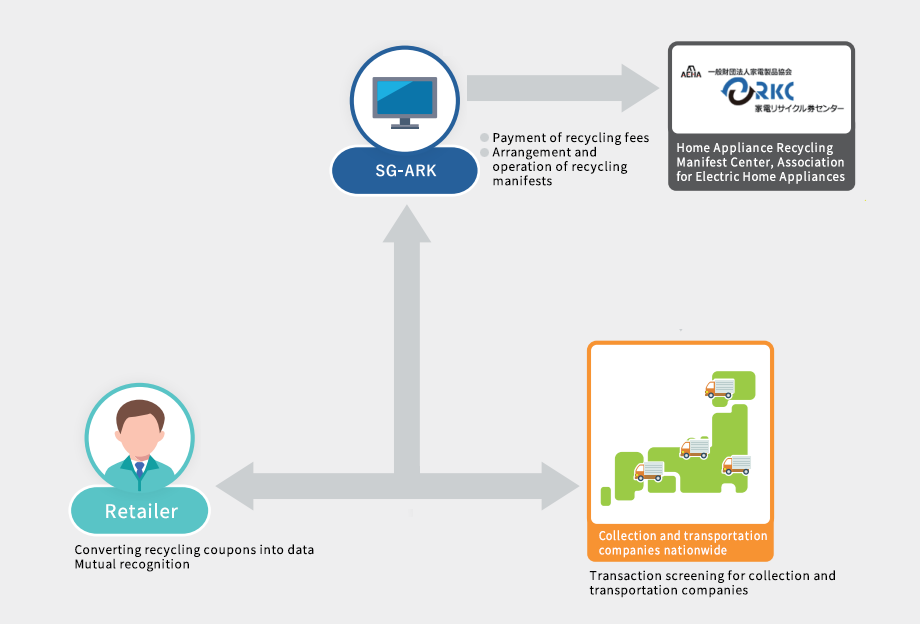
Reducing Food Loss
Donations of Emergency Food Stockpiles (SGH Global Japan)
To reduce food waste and support those struggling to get by, SGH Global Japan donated the emergency food stockpiles held for its employees to Second Harvest Japan (Taito-ku, Tokyo), an NPO engaged in food bank activities.
Through NPOs and other organizations, food banks collect food and drink products that are perfectly safe to consume and would otherwise be disposed of. These food banks then provide these products, free of charge, to homeless people and welfare facilities.
As the food stockpiles it kept for natural disasters and other emergencies were approaching their expiry date, in 2021 SGH Global Japan donated 115 cans of bread and 264 liters of mineral water to Second Harvest Japan.
Promoting Environmentally Friendly Business Activities

